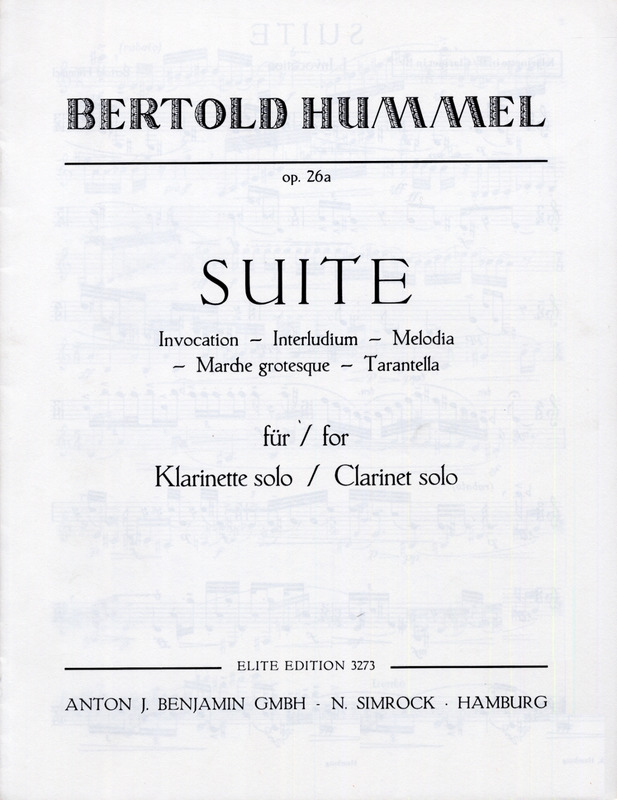Suite for Clarinet solo, op. 26a (1963)
I. Invocation
II. Interludium
III. Melodia
V. Tarantella
First
performance: December 10, 1963, Würzburg, Aula der
Mozartschule
Ernst Flackus
Duration: 11 Minutes
Publisher: N. Simrock Hamburg-London (Boosey & Hawkes) ISMN: 9790221112545
 LP:
Jack Brymer - Clarinet
LP:
Jack Brymer - ClarinetWith the Suite
for Clarinet solo, op. 26a, - in five
movements: Invocation, Interludium, Melodia,
Marche grotesque and Tarantella
- Hummel presents the first of a whole series of
clarinet pieces. With the scurrilous Marche
grotesque, he criticises militarism and releases
himself from the stigmatisation of having taken part in
the war as a youth. In the same humorous way as
Hindemith, he pokes fun at the parade steps of the
soldatesca and gives us a foretaste of what would be
given clear utterance in later years in the anti-war
piece, "The Last Flower".
Klaus Hinrich Stahmer (in "Kammermusik als persönliches Bekenntnis", Tutzing 1998)
The pianist
Françoise Deslogères (1929-2020), who worked with the
inventor Maurice Martenot and his sister Ginette
Martenot on the electronic instrument Ondes Martenot
from 1957, played ‘Interlude et mélodie’ from Hummel's
Suite op. 26a on the Ondes Martenot in May 1969 at
performances in Paris and Bordeaux.
Press
Tibia 1984
After the pieces for clarinet solo by Igor Strawinsky, a great number of solo works for clarinet came onto the market in recent times. Only a few composers, however, attained an originality comparable to the model; indeed, one could even go so far as to say that most of the solo pieces turned out to be nothing more than musically interesting studies. An exception, that cannot be too highly praised, is therefore the Suite for Clarinet solo written in 1963 by Bertold Hummel (born 1925), currently president of the music college in Würzburg. Hummel does his work without modern antics, i.e. he does not build his work up from new sources of sound, whose discovery is for many composers enough to justify creating a new composition, to which terms such as theme or melody have lost all relevance. From Hummel's pen, we have received a suite which ill-willed critics may well call conservative, but which in its honesty towards rhythm and melody, even in age of no-longer existent musical criteria, will very likely meet with success.
Dieter Klöcker

